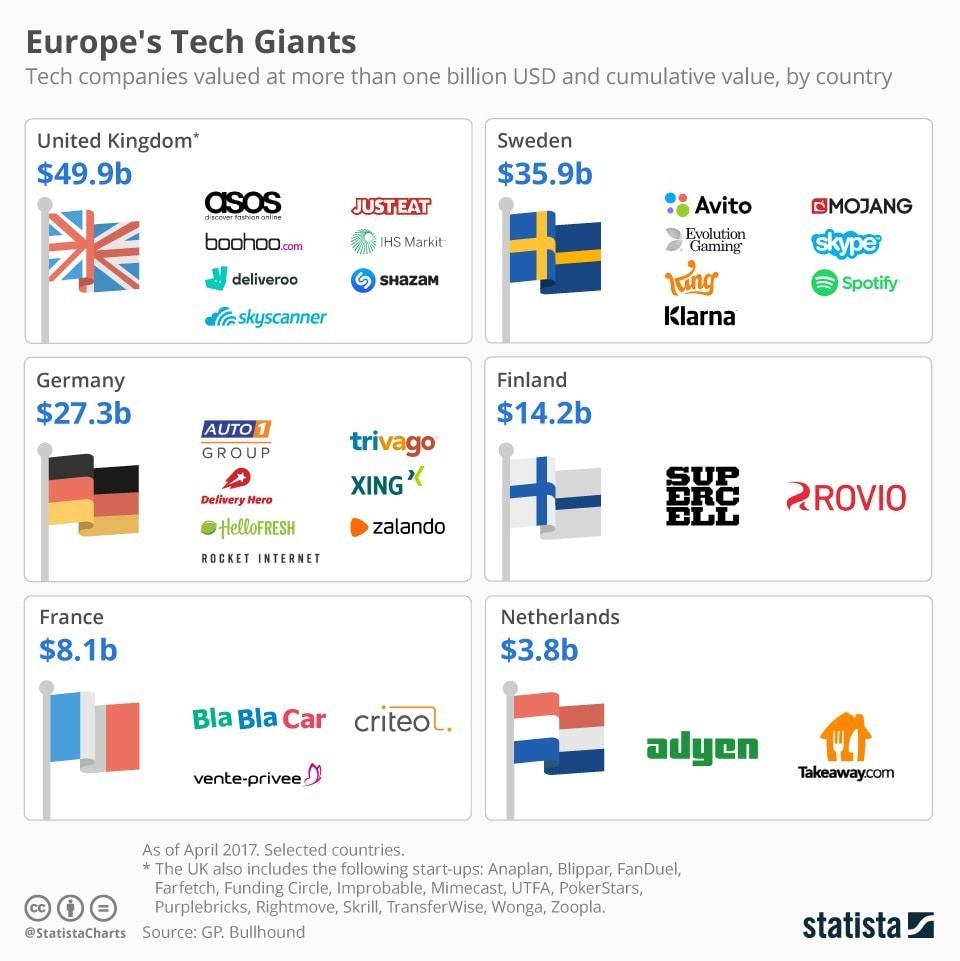Why does Sweden produce so many startups?

Sweden's capital is second only to Silicon Valley when it comes to the number of “unicorns” produced per capita. Image: REUTERS
What do Spotify, Minecraft and Candy Crush Saga have in common?
They were all made in Sweden.
Skype was co-founded by Swedes and SoundCloud started in Stockholm before moving to its current home in Berlin.
Sweden is home to Europe’s largest tech companies and its capital is second only to Silicon Valley when it comes to the number of “unicorns” – billion-dollar tech companies – that it produces per capita.

Why has Sweden proven so successful in encouraging digital entrepreneurs to start and grow new businesses?
One counter-intuitive and somewhat controversial answer is its high levels of taxation.
Taxing economy
Despite research showing that countries with large government and high tax-and-spend tend to be less entrepreneurial, Sweden’s tech businesses have benefitted from both the social and physical infrastructure that such an approach can provide.
When it comes to average internet speeds, the country is only bettered by its neighbour Norway and South Korea.
More than 60% of the country has access to super-fast fiber-optic broadband with speeds of 100 megabits per second, and the Swedish government wants that figure to rise 90% by 2020.
The rollout of this fiber-optic infrastructure has been directly financed by the Swedish government in rural areas, and heavily subsidized everywhere else.
It isn’t the first time the government has funded a mass rollout of technology: in the 1990s it subsidized households to buy PCs, which academics claim meant there was soon a computer in nearly every Swedish home.
Sebastian Siemiatkowski, founder and CEO of $2.5 billion ecommerce startup Klarna, credits this “visionary” policy as the reason he was able to begin coding age 10.
Today nearly 95% of Sweden's population use the internet, compared to just 84% in the US.
All this is reflected in its top 5 ranking for technological readiness in The Global Competitiveness Report 2017.
Sweden is also among the top-performing nations in the report for its macroeconomic environment.
“Free” healthcare and higher education are paid for by income taxes for middle earners that can be as high as 60%.
And while the tax level is listed by The Global Competitiveness Report 2017 as the most problematic factor when doing business in Sweden, the government’s minister for enterprise and innovation Mikael Damberg claims the country’s social safety net means entrepreneurs are more free to take risks.

Deregulation
Sweden’s success as a hub for tech startups is part of a wider story of economic growth kickstarted by a series of market reforms in the 1990s.
In the wake of a financial crisis, the government sought to introduce private competition into areas previously dominated by state-controlled entities.
Many public monopolies were deregulated, including taxis, electricity, telecommunications, railways, and domestic air travel services.
Other public services, including elderly care, primary and secondary education, and preschools, were outsourced to private firms.
A Competition Act was introduced in 1993 to block big mergers and anti-competitive practices.
And tax rates began to come down, particularly corporation tax, which has fallen from 52% in 1990 to 22% today – far lower than the US rate of 38.9%.
It has led one group of Swedish academics to publish a paper claiming that Sweden is now more entrepreneurial than the US.
The paper points out that in recent years young Swedish firms aged five years or less have on average accounted for 55% of all of the country’s businesses.
In the same time period, the share of young firms in the US fell from approximately 45% to less than 40%.
The Swedish government is even seeking to address tech companies’ concerns that high income tax levels make it difficult to attract global talent.
It is doing this by lowering taxes on startup stock options – a common method of compensation by new companies that want to attract the best talent but cannot compete with established companies on salaries.
Trust
One final vital ingredient for Sweden’s startup success may be a special quality endemic in Swedish society: trust.
According to an EU-funded study, Sweden comes second only to Denmark for “intrapreneurship” – loosely defined as collaborative, innovative working within companies by employees.
Intrapreneurship thrives when there is a high level of trust, both within individual economies, and society at large.
Employees are more likely to be innovative when they are trusted by their employers with a greater level of autonomy in their roles. Equally, employees are more likely to be collaborative when they trust their colleagues.
The paper points out that trust among employers is more likely to be high when trust in the wider economy is high.
A strong level of trust is deeply rooted in Swedish culture, which may explain why so many Swedes trust the government to spend their money for them.
This in turn creates an environment of a strong social safety net, including generous maternity and paternity leave, which may make employees feel more secure at work.
The high level of trust also benefits entrepreneurism, with large established companies trusting small startups enough to collaborate and share knowledge with them.
Don't miss any update on this topic
Create a free account and access your personalized content collection with our latest publications and analyses.
License and Republishing
World Economic Forum articles may be republished in accordance with the Creative Commons Attribution-NonCommercial-NoDerivatives 4.0 International Public License, and in accordance with our Terms of Use.
The views expressed in this article are those of the author alone and not the World Economic Forum.
Stay up to date:
Innovation
Forum Stories newsletter
Bringing you weekly curated insights and analysis on the global issues that matter.






